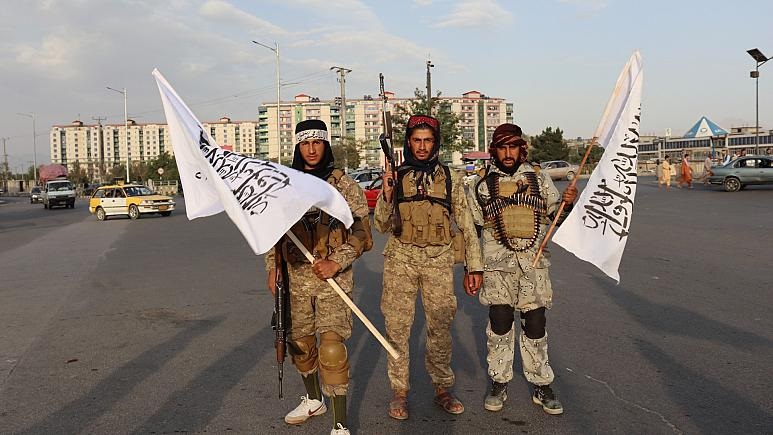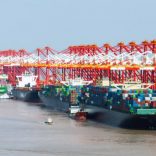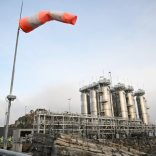First results for Syria's new parliament show low share for minorities, women
Taliban rejoice as they take control of Kabul airport but face multiple crises

Taliban fighters hold Taliban flags in Kabul, Afghanistan, Monday, Aug. 30, 2021. [Photo:AP/Khwaja Tawfiq Sediq]
The Taliban celebrated the US military withdrawal out of Afghanistan on Tuesday, reiterating that they want good diplomatic relations with Washington.
Fighters from the militant group watched the last US planes disappear into the sky over Afghanistan around midnight Monday and then fired their guns into the air, celebrating victory after a 20-year insurgency that drove the world’s most powerful military out of one of the poorest countries.
The group was then in full control of the airport and vehicles raced back and forth along the Hamid Karzai International Airport’s sole runway on the northern, military side of the airfield. Before dawn broke, heavily armed Taliban fighters walked through hangars, passing some of the seven CH-46 helicopters the US State Department used in its evacuations before rendering them unflyable.
Taliban leaders later symbolically walked across the runway, marking their victory while flanked by fighters of the insurgents’ elite Badr unit.
“The world should have learned its lesson and this is the enjoyable moment of victory,” Taliban spokesman Zabihullah Mujahid said in a livestream posted by a militant.
Taliban fighters draped their white flags over barriers at the airport as others guarded the civilian side of the airfield. Inside the terminal, several dozen suitcases and pieces of luggage were left strewn across the floor, apparently left behind in the chaos. Clothes and shoes also were scattered. A poster of Ahmad Shah Massoud, the famed anti-Taliban fighter, had been destroyed.
“After 20 years we have defeated the Americans,” said Mohammad Islam, a Taliban guard at the airport from Logar province, cradling a Kalashnikov rifle. “They have left and now our country is free.”
“It’s clear what we want. We want Shariah (Islamic law), peace and stability,” he added.
Mohammad Naeem, a spokesman for the Taliban’s political office in Qatar, similarly praised the takeover in an online video early Tuesday.
“Thank God all the occupiers have left our country completely,” he said, congratulating fighters by referring to them as mujahedeen, or holy warriors. “This victory was given to us by God. It was due to 20 years of sacrifice by the mujahedeen and its leaders. Many mujahedeen sacrificed their lives.”
Economy, health and diplomacy
But the celebrations could be short-lived as the Taliban face multiple crises.
Last week, an Islamic State suicide attack at an airport gate killed at least 169 Afghans and 13 U.S. service members. The jihadist group also launched six rockets towards the airport on Monday.
The economy — already one of the poorest in the world — lies in tatters as crucial international funds have dried up since the Taliban’s breathtaking sweep across the country.
Both the IMF and World Bank have suspended payments. The EU and Germany have frozen development funds to the country — worth over a billion euros over the next seven years — until they say the Taliban can fulfill certain conditions, notably on human rights.
The majority of the billions of dollars Afghanistan holds in foreign reserves is now frozen in America, pressuring its now-depreciating Afghani currency. Banks have implemented withdrawal controls, fearing runs on their deposits in the uncertainty. Civil servants across the country say they haven’t received their salary in months.
The group had also urged the US and their allies not to evacuate “Afghan experts”, suggesting they fear a brain drain. Overall, 123,000 people were flown out of the country between August 14 and August 31, most of them Afghans who worked with the international community over the past two decades.
Medical equipment remains in short supply, while thousands who fled the Taliban’s advance remain living in squalid conditions. A major drought also has cut into the country’s food supplies, making its imports even more important and raising the risk of people going hungry.
The Taliban may also struggle to form solid diplomatic relations despite a spokesperson reiterating on Tuesday that they want “good relations” with Washington.
The group of seven biggest industrialised nations stressed following an extraordinary summit last week that they would “judge the Afghan parties by their actions, not words” and that the Taliban “will be held accountable for their actions on preventing terrorism, on human rights in particular those of women, girls and minorities and on pursuing an inclusive political settlement in Afghanistan.”
“The legitimacy of any future government depends on the approach it now takes to uphold its international obligations and commitments to ensure a stable Afghanistan,” the G7, which comprises Canada, France, Germany, Japan, the UK, and the US, added.
The Taliban have sought to soften their image, promising no retribution against Afghans who had worked with the international community and allowing women to continue working “within Islamic law”. They also said they would bring production of opium — from which they derived a lot of their revenues in the past 20 years — back to zero.
During its brutal rule from 1996 to 2001, the Taliban regime was only recognised by Pakistan, Saudi Arabia, and the UAE.












Leave a Reply
Be the First to Comment!
You must be logged in to post a comment.
You must be logged in to post a comment.